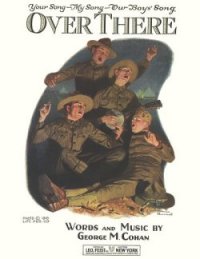
| Illuminations
Home |
|
| Military
Songs |
|
| The Revolution & Before | |
| The
Wabash to Mexico City |
|
| Civil War | |
| Indian Wars | |
| Spanish-American War | |
| World War One | |
| World War Two | |
| Cold War | |
| Vietnam War | |
| Global War on Terror | |
Illuminations, Epiphanies, & Reflections
Military
Songs
American
Revolution and Before- The Liberty Song
Between
1761 and
1773, Parliament passed of series of acts the
American
colonists believed trampled on their
rights as British citizens. In 1761, a series of Writs of Assistance
were put into effect that were, in effect, blanket search
warrants. The Proclamation of 1763 forbade colonists from
crossing the Appalachian Mountains. The Revenue Act of 1764
all
but eliminated New England 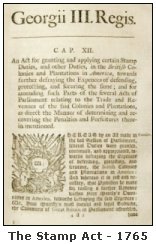 shippers
from transporting
molasses, and
that same year, the Sugar Act placed a tariff on sugar, wine, and
coffee. The colonists found the Stamp Act of 1765 especially odious as
it required a tax stamp to be purchased for every official document,
legal instrument, license, newspaper, and similar piece of
paper.
The
resentment was compounded when it became apparent that the money raised
from the tax was to support a standing army on American soil, which the
colonists feared would be used to suppress their dissent.
Although the Stamp Act was repealed in 1766, an even more distasteful
law, the
Declaratory Act quickly followed that stated Parliament could tax
anything and everything within America as it saw fit, and it did; Townshend
Taxes were levied on paint, glass, lead, paper, and, of course, tea.
In response, American patriots throughout the colonies who opposed
these measures began to refer to themselves as Sons and Daughters of
Liberty after they were described as such in Parliament by Isaac Barre,
a supporter of the American cause. shippers
from transporting
molasses, and
that same year, the Sugar Act placed a tariff on sugar, wine, and
coffee. The colonists found the Stamp Act of 1765 especially odious as
it required a tax stamp to be purchased for every official document,
legal instrument, license, newspaper, and similar piece of
paper.
The
resentment was compounded when it became apparent that the money raised
from the tax was to support a standing army on American soil, which the
colonists feared would be used to suppress their dissent.
Although the Stamp Act was repealed in 1766, an even more distasteful
law, the
Declaratory Act quickly followed that stated Parliament could tax
anything and everything within America as it saw fit, and it did; Townshend
Taxes were levied on paint, glass, lead, paper, and, of course, tea.
In response, American patriots throughout the colonies who opposed
these measures began to refer to themselves as Sons and Daughters of
Liberty after they were described as such in Parliament by Isaac Barre,
a supporter of the American cause.John Hancock, vehemently protested these new taxes, and continued to import tea without paying the duty. As a result his ship, Liberty, was seized, its cargo of tea confiscated, and he was arrested and charged with smuggling. John Adams mounted a rigorous defense in court, and the case was eventually dropped, but anger swelled in Boston. Hancock then organized an incredibly successful boycott of East India tea, and over the next several years the company's sales 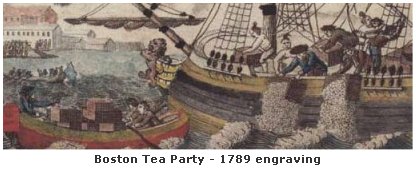 dropped
from 320,000
pounds to 520 pounds. In 1773, the
infamous Tea
Act was passed, giving the East India Tea Company what amounted to a
monopoly on the colonial tea trade, and in late November
three
British ships, the HMS
Dartmouth, HMS
Beaver, and HMS Eleanor, arrived
with shipments of
tea. Sam Adams and a group of Sons of
Liberty
met the vessels with a series of protest rallies that prevented
anything from being unloaded. Then on the evening of 16
December,
a number of Sons of Liberty left a gigantic
protest
rally, very thinly disguised as Mohawk Indians, and headed to Griffin's
Wharf were the ships were moored. There, they boarded the
vessels
and dumped 342
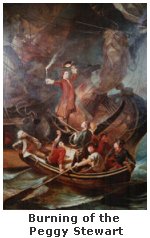 chests of tea worth nearly
10,000 pounds sterling into the sea. After
cleansing
themselves of all traces of evidence, the men marched off in defiance,
their fife playing, right past the home where they knew the British
Admiral
Montague had been staying to spy on their work. As they
marched
passed, Montague yelled, "Well boys, you have had a fine, pleasant
evening for your Indian caper, haven't you? But mind, you have to to
pay the fiddler yet!" Montague's
threat was far from hollow, for following the Boston Tea Party,
Parliament imposed what have come to be known as the Punitive or
Intolerable Acts upon all of the colonies to force them--especially
Massachusetts--to submit to its will. These
acts,
which included the closing the port of Boston, gave rise to a number of
radical responses--to include the burning of a tea ship in
Annapolis.
chests of tea worth nearly
10,000 pounds sterling into the sea. After
cleansing
themselves of all traces of evidence, the men marched off in defiance,
their fife playing, right past the home where they knew the British
Admiral
Montague had been staying to spy on their work. As they
marched
passed, Montague yelled, "Well boys, you have had a fine, pleasant
evening for your Indian caper, haven't you? But mind, you have to to
pay the fiddler yet!" Montague's
threat was far from hollow, for following the Boston Tea Party,
Parliament imposed what have come to be known as the Punitive or
Intolerable Acts upon all of the colonies to force them--especially
Massachusetts--to submit to its will. These
acts,
which included the closing the port of Boston, gave rise to a number of
radical responses--to include the burning of a tea ship in
Annapolis. 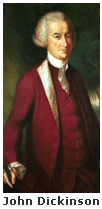 What,
one may wonder, does all
this have to do with music. The
answer is that
during this period, Americans expressed their frustration and anger
publicly in songs that were published in and distributed by
newspapers, pamphlets,
and broadsides. Some of these songs were plaintive and
pleading,
however for more were assertive and demanding. The songs were
all
in
traditional British style and frequently based on old English
tunes.
By far, the most famous of these protest
songs was
written by John Dickinson in 1768 as a
response to the
Declaratory Laws and Townshend Taxes What,
one may wonder, does all
this have to do with music. The
answer is that
during this period, Americans expressed their frustration and anger
publicly in songs that were published in and distributed by
newspapers, pamphlets,
and broadsides. Some of these songs were plaintive and
pleading,
however for more were assertive and demanding. The songs were
all
in
traditional British style and frequently based on old English
tunes.
By far, the most famous of these protest
songs was
written by John Dickinson in 1768 as a
response to the
Declaratory Laws and Townshend Taxes 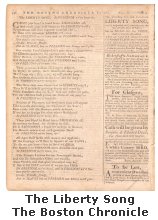 Dickinson titled the work,
"The Liberty Song," and its
words--written to be sung to the tune "Hearts of Oak," a patriotic air
associated with the Royal Navy--were first published in Boston
newspapers. The most famous phrase in the song is “By
uniting we stand, by dividing we fall.” The song was an
immediate
hit in Boston and spread like wildfire throughout the colonies, soon
becoming a standard at any protest meeting. It was adopted as
a
rallying song by The Sons of Liberty preceding the Boston Tea Party,
and no doubt was one of the tunes that Admiral Montague "enjoyed" as
the "Mohawks" marched by. The Liberty Song was sung
throughout the colonies as the most popular protest anthem until
independence was declared in 1776.
Dickinson titled the work,
"The Liberty Song," and its
words--written to be sung to the tune "Hearts of Oak," a patriotic air
associated with the Royal Navy--were first published in Boston
newspapers. The most famous phrase in the song is “By
uniting we stand, by dividing we fall.” The song was an
immediate
hit in Boston and spread like wildfire throughout the colonies, soon
becoming a standard at any protest meeting. It was adopted as
a
rallying song by The Sons of Liberty preceding the Boston Tea Party,
and no doubt was one of the tunes that Admiral Montague "enjoyed" as
the "Mohawks" marched by. The Liberty Song was sung
throughout the colonies as the most popular protest anthem until
independence was declared in 1776. |
| The
Liberty Song (to the tune of Hearts of Oak) Come, join hand in hand, brave Americans all, And rouse your bold hearts at fair Liberty's call; No tyrannous acts shall suppress your just claim, Or stain with dishonor America's name. Chorus: In Freedom we're born and in freedom we'll live, Our purses are ready, Steady, friends, steady, Not as slaves, but as freemen our money we'll give. Our worthy forefathers, let's give them a cheer, To climates unknown did courageously steer; Thro' oceans to deserts for freedom they came, And dying, bequeath'd us their freedom and fame. Chorus The tree their own hands had to Liberty rear'd, They lived to behold growing strong and revered; With transport they cried, now our wishes we gain, For our children shall gather the fruits of our pain. Chorus Then join hand in hand, brave Americans all, By uniting we stand, by dividing we fall; In so righteous a cause let us hope to succeed, For heaven approves of each generous deed. Chorus |